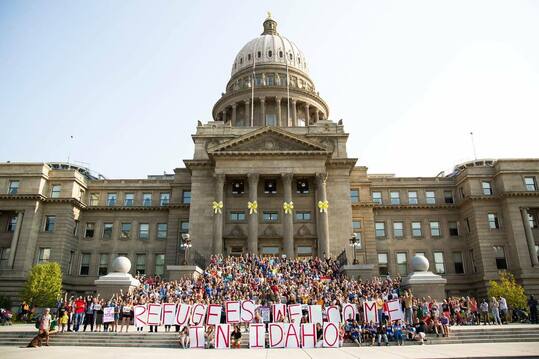|
The city of Boise is a welcoming community made up of a beautifully diverse population. For years, it has served as a safe harbor for refugees, not only as a destination on their long journey to find asylum, but also as a place to call home. The process of resettling in a new country is difficult and involves culture shock, learning a new language, and redefining your entire life.
The stories of the members of our community that have come here as refugees are important and deserve to be voiced. Whether they can tell their story in English, or with the help of a translator, we are here to listen to their stories in their purest forms. |
 According to Refugees Welcome, there are 60 million refugees throughout the world, and many more people will flee violence, persecution, and conflict in the coming years. Unfortunately, there are limits on the number of refugees allowed in particular cities, states, and countries. The cap on foreign-born refugees in the U.S. was 45,000 in 2018, and the cap will dip to 30,000 in 2019, Reuters reports. But some U.S. states are already seeing a smaller influx of refugees following widespread regulations put in place in early 2017. In Idaho, refugee numbers have dropped significantly in recent years. The Idaho Statesman reports that 628 refugees resettled in the state in 2017, down from 1,135 in 2016. The Idaho Statesman data also indicates that, in both years, the majority of refugees came from the Democratic Republic of the Congo, a country that has been in a state of unrest and civil war since 1997. And here in Idaho, those refugees have become an essential part of their new communities. Here are six ways that refugees give back, making their new communities richer and more vibrant. 1. Refugees Contribute to the EconomyTourism is a trillion-dollar industry, but local economies depend more on resident spending than tourist dollars. When refugees settle in a city, they’re looking to make a home. Thus, they enter the job market and pay taxes. Refugees play a vital role in the local economy: In Ada County, Idaho alone in 2016, foreign-born residents earned more than $638 million and paid $49.6 million in state and local taxes. Those numbers make for a significant impact on the local economy. 2. Refugees Bring New CulturesWhen we stay in a proverbial “box,” interacting with the same people, in the same places, for our entire lives, we end up with a narrow worldview. Refugees provide a refreshing change and the chance to experience other cultures without leaving home. Families and individuals seeking asylum bring more than just themselves when they arrive in a new place. Their culture also comes with them — encompassing beliefs, experiences, languages, and food. 3. Refugees Bring New FoodsSampling food from a refugee’s homeland provides more insight to their culture than can be gleaned from a simple conversation. Food is intrinsically linked to our culture, values, and experiences, and it’s just one of the numerous good things about refugees. There’s even an entire week devoted to the celebration of ethnic food. The 2018 Refugee Restaurant Week was held the second week of October, featuring a variety of cuisine from Nepal, Syria, and Somalia. Community members who didn’t get a chance to participate can stop by one of the numerous area eateries that are owned by refugees, including Kabob House in Boise and Sofra Bosnian Grill in Meridian. 4. Refugees Bring Skilled LaborIdaho’s tech industry is growing at a rapid rate, leaving a significant gap in its wake. There is a statewide deficit of skilled labor in industries including construction, according to data from the U.S. Bureau of Labor Statistics. By 2022, Idaho’s construction industry will add nearly 12,000 jobs. Refugees are poised to fill those positions, as well as positions in other growing labor-intensive industries, such as alternative energy and healthcare. In their home country, many refugees held jobs that required skilled labor, and they honed those skills over the years. When those skilled refugees resettle in America, they bring those skills along with them. 5. Former Refugees Help With Future Refugee ResettlementWhile long-standing members of the general community mean well, some new refugees may feel more comfortable receiving help from another refugee who understands the nuances of resettling in a completely different country and culture. Fortunately, refugees who have moved to our communities many years ago are up to the challenge. Former refugees stand ready to turn around and help the next generation of refugees from their region, providing a friendly face and helping ease the transition. 6. Refugees Give Us a Chance to Be AltruisticIt feels good to give back, and refugees provide ample opportunity to do so. Many refugees come from regions where life has been made very difficult, either by an oppressive government, or war. By helping them, you can make a difference in a tangible way, and there are numerous ways you can help refugees build a better life in their new home. How You Can Give Back to RefugeesIf you want to learn how to help refugees, you have plenty of opportunity to do so every time you step outside your front door. The first step is a simple one: Be kind! And don’t assume anything — if you’re curious about a refugee’s clothing, food, or customs, just ask. A simple question to a single refugee can lead to a long-lasting, enriching relationship with the entire refugee community.
Just as important is advocacy. You can use your voice to empower refugees in your community, in your state, and in the country. The two main ways to advocate are to speak up for refugees by engaging in positive conversations about refugees, welcoming refugees when you can, and attending refugee organization events. Just as important is to reach out to your local, state, and federal representatives and use your voice to advocate for refugees. Another way to help refugees is by donating your gently used household items and seasonal clothing. Note that, due to the decrease in refugee numbers since 2017, the Agency for New Americans (ANA) doesn’t accept certain items, so check the in-kind need list prior to handing over your donation. And remember that gift cards are always appreciated. If you’re more into the hands-on approach when it comes to giving back, consider volunteering at ANA. Volunteer opportunities include fundraising and marketing, English language tutoring, and family mentoring. Volunteers are essentially the lifeforce of ANA, helping refugee clients to navigate their new home.
0 Comments
Your comment will be posted after it is approved.
Leave a Reply. |


 RSS Feed
RSS Feed
